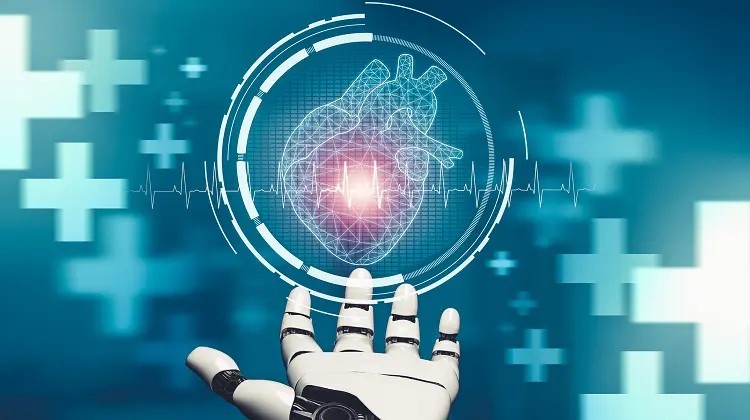Machine learning (ML) is transforming healthcare by enabling predictive models that forecast diseases, optimize treatment plans, and enhance patient care. By analyzing vast amounts of medical data, ML-driven solutions help in early disease detection, personalized medicine, and hospital resource management. This shift from reactive to proactive healthcare enhances medical decision-making and improves patient outcomes while reducing costs.
Key Applications of Machine Learning in Predictive Healthcare
1. Early Disease Detection and Diagnosis
- ML algorithms analyze medical imaging, genetic data, and electronic health records (EHRs) to identify early signs of diseases such as cancer, Alzheimer’s, and cardiovascular disorders.
- AI-powered tools detect subtle patterns in MRI scans, X-rays, and pathology slides, often outperforming human radiologists in accuracy.
- Example: Google’s DeepMind Health developed an AI model that detects diabetic retinopathy in retinal scans with higher precision than traditional methods.
2. Personalized Treatment and Precision Medicine
- ML-driven predictive analytics enable customized treatment plans by analyzing a patient’s genetic makeup, medical history, and lifestyle factors.
- Drug response prediction models help in prescribing targeted therapies, minimizing adverse effects.
- Example: IBM Watson for Oncology recommends personalized cancer treatment plans based on extensive medical literature and patient data.
3. Predicting Disease Progression and Risk Assessment
- AI models use historical patient data to forecast disease progression, helping doctors intervene before conditions worsen.
- Risk prediction tools identify patients susceptible to chronic diseases such as diabetes, stroke, and heart disease based on lifestyle and biometrics.
- Example: The Framingham Heart Study uses ML to predict cardiovascular disease risks based on patient demographics and medical history.
4. AI-Powered Virtual Health Assistants
- Intelligent chatbots and voice assistants provide real-time health advice, reducing the burden on healthcare professionals.
- ML-driven symptom checkers analyze patient inputs and recommend possible diagnoses.
- Example: Babylon Health’s AI chatbot offers preliminary diagnoses based on symptoms, mimicking a physician’s consultation.
5. Predictive Analytics in Hospital Management
- ML optimizes hospital operations, resource allocation, and patient flow to improve efficiency.
- Predictive models help hospitals prepare for patient surges, optimizing bed management, staffing, and supply chain logistics.
- Example: The Mayo Clinic leverages AI to predict ICU admissions, enabling hospitals to allocate critical resources effectively.
6. Enhancing Drug Discovery and Development
- Traditional drug discovery takes years and billions of dollars—ML accelerates this process by identifying potential drug candidates.
- AI-driven simulations predict drug interactions, side effects, and efficacy, reducing the need for costly trials.
- Example: Insilico Medicine uses ML models to design new drug compounds and shorten drug discovery timelines.
7. Remote Patient Monitoring and Predictive Alerts
- ML-powered wearable devices track heart rate, glucose levels, and blood pressure, providing real-time health insights.
- Predictive alerts notify doctors and caregivers of impending health issues, such as heart attacks or strokes.
- Example: Apple’s ECG-enabled smartwatch detects irregular heart rhythms and warns users of potential cardiac risks.
Challenges and Ethical Considerations
1. Data Privacy and Security Risks
- ML-driven healthcare relies on sensitive patient data, making it vulnerable to cyber threats and misuse.
- Strong encryption, blockchain integration, and regulatory compliance (HIPAA, GDPR) are crucial for data protection.
2. Bias in AI Models and Ethical Dilemmas
- ML algorithms trained on biased datasets can produce inaccurate predictions, disproportionately affecting marginalized groups.
- Ethical AI frameworks and transparent model training are necessary to ensure fairness in healthcare decision-making.
3. Integration with Existing Healthcare Systems
- Many hospitals and clinics use outdated IT systems, making it difficult to integrate ML-powered solutions seamlessly.
- Adoption of standardized health data formats and interoperability protocols is needed for smooth implementation.
Future Prospects of Machine Learning in Healthcare
- Quantum computing will further enhance ML’s predictive capabilities, enabling faster disease modeling and drug simulations.
- AI-driven digital twins will allow doctors to simulate a patient’s biological system, testing treatments virtually before real-world application.
- Federated learning will enable secure AI training on distributed healthcare data, ensuring privacy while improving predictive accuracy.
Machine learning is reshaping the future of healthcare by enabling faster, more accurate diagnoses, personalized treatments, and predictive health insights. As technology advances, AI-driven predictive healthcare will continue to revolutionize medical practices, saving lives and reducing healthcare costs worldwide.
From Our Editorial Team
Our Editorial team comprises of over 15 highly motivated bunch of individuals, who work tirelessly to get the most sought after curated content for our subscribers.


